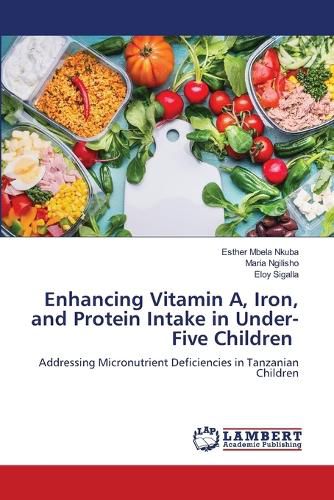Readings Newsletter
Become a Readings Member to make your shopping experience even easier.
Sign in or sign up for free!
You’re not far away from qualifying for FREE standard shipping within Australia
You’ve qualified for FREE standard shipping within Australia
The cart is loading…






This title is printed to order. This book may have been self-published. If so, we cannot guarantee the quality of the content. In the main most books will have gone through the editing process however some may not. We therefore suggest that you be aware of this before ordering this book. If in doubt check either the author or publisher’s details as we are unable to accept any returns unless they are faulty. Please contact us if you have any questions.
Micronutrient deficiencies are a significant public health issue in Tanzania, particularly affecting children under five and pregnant women. Addressing malnutrition can be achieved through nutrition education and food-based strategies implemented from local to national levels. A study conducted in the Kagera region of Tanzania aimed to tackle these deficiencies by modifying local recipes and developing nutrient-rich foods, specifically targeting children under five years of age. The study successfully enriched popular dishes with enhanced levels of vitamin A, iron, and protein, meeting or exceeding recommended dietary allowances. Laboratory analyses and bioaccessibility tests were conducted to ensure the nutritional content and absorption. Additionally, sensory evaluations confirmed the acceptability of the modified recipes, indicating their potential to meet the nutritional needs of young children in Tanzania and similar communities across Africa.
$9.00 standard shipping within Australia
FREE standard shipping within Australia for orders over $100.00
Express & International shipping calculated at checkout
This title is printed to order. This book may have been self-published. If so, we cannot guarantee the quality of the content. In the main most books will have gone through the editing process however some may not. We therefore suggest that you be aware of this before ordering this book. If in doubt check either the author or publisher’s details as we are unable to accept any returns unless they are faulty. Please contact us if you have any questions.
Micronutrient deficiencies are a significant public health issue in Tanzania, particularly affecting children under five and pregnant women. Addressing malnutrition can be achieved through nutrition education and food-based strategies implemented from local to national levels. A study conducted in the Kagera region of Tanzania aimed to tackle these deficiencies by modifying local recipes and developing nutrient-rich foods, specifically targeting children under five years of age. The study successfully enriched popular dishes with enhanced levels of vitamin A, iron, and protein, meeting or exceeding recommended dietary allowances. Laboratory analyses and bioaccessibility tests were conducted to ensure the nutritional content and absorption. Additionally, sensory evaluations confirmed the acceptability of the modified recipes, indicating their potential to meet the nutritional needs of young children in Tanzania and similar communities across Africa.